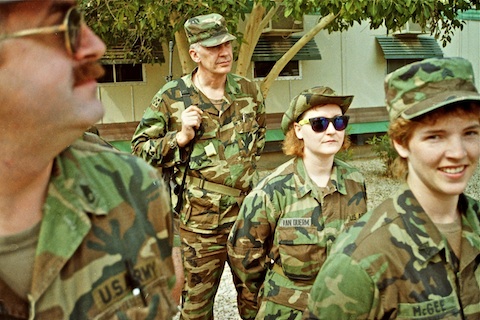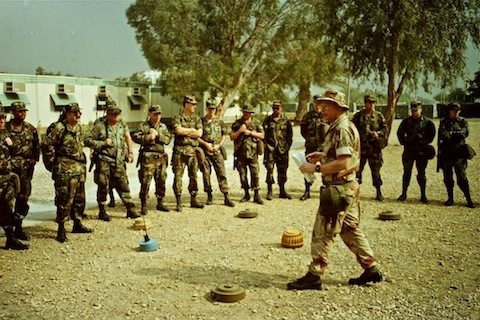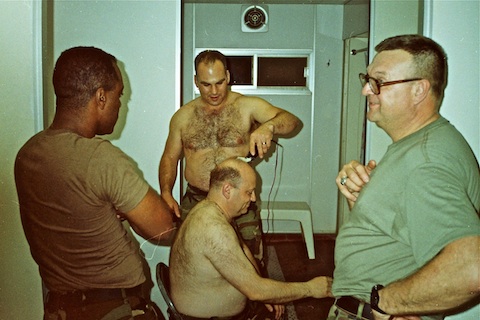Mission Assigned: Kuwait City
Jubayl, Saudi Arabia—She then related how a Kuwaiti family gave her a place to hide during the occupation. When the Iraqis finally arrived at her location, the family hid her in a book case. Iraqi soldiers searched the home and offered the cook — a non-Kuwaiti — a huge bribe to reveal her presence, but the cook feigned ignorance. Later the volunteer had seen more than one Iraqi killed on the street outside the home. A couple by the action of a child who offered one Iraqi a bottle of poisoned water. Later, another Iraqi discovered the soldier’s body; and then he proceded to drink the water, and died.

The volunteer also related a case where Iraqis entered a shop, but were asked by a “mullah” — supposedly, in this case, a Moslem priest — to leave their weapons with him outside the shop, so that women and children inside the shop would not be frightened. However, as the Iraqis came out of the shop, they were killed by resistance fighters using the Iraqis’ weapons. The trick was used successfully several times.
This briefing, along with the SCUD alerts, gave many people in the 432nd without combat experience a lot to think about. Unit members began realizing the seriousness of their mission. Other briefings provided additionally valuable insights.

One naval commander, a psychiatrist, provided surprising information regarding battle fatigue. His own method of delivery was a lesson in itself of psychological manipulation, by heavily relying on jokes aimed at dehumanizing the enemy. He reminded the group of how much contempt people used to have for soldiers with battle fatigue, or what in World War II was called shell shock. General George Patton’s slapping one soldier was the most familiar example of that contempt. More recently however doctors realized that the symptoms are easily treated: mainly by keeping the service member with their unit to prevent a sense of guilt at being sent to the rear and also by allowing the person to “sleep off” the fatigue. In virtually every case soldiers were completely rehabilitated with twenty-four hours of rest and were able to resume their mission.

Members of the 432nd with combat experience, or who had served in the Cuban emergency in 1980 at Ft. McCoy, expected to have long periods of sleepless days awaiting them in Kuwait. Fortunately, that aspect of the unit’s mission never materialized.
The 432nd was saved the nightmare of street fighting for the same reasons that residents of Kuwait City were saved the nightmare of prolonged destruction and atrocities under Iraqi occupation: the sudden and panicked withdrawal of Iraqi troops on Monday, February 25.
| Page 12 | Page 13 | Page 14 |
